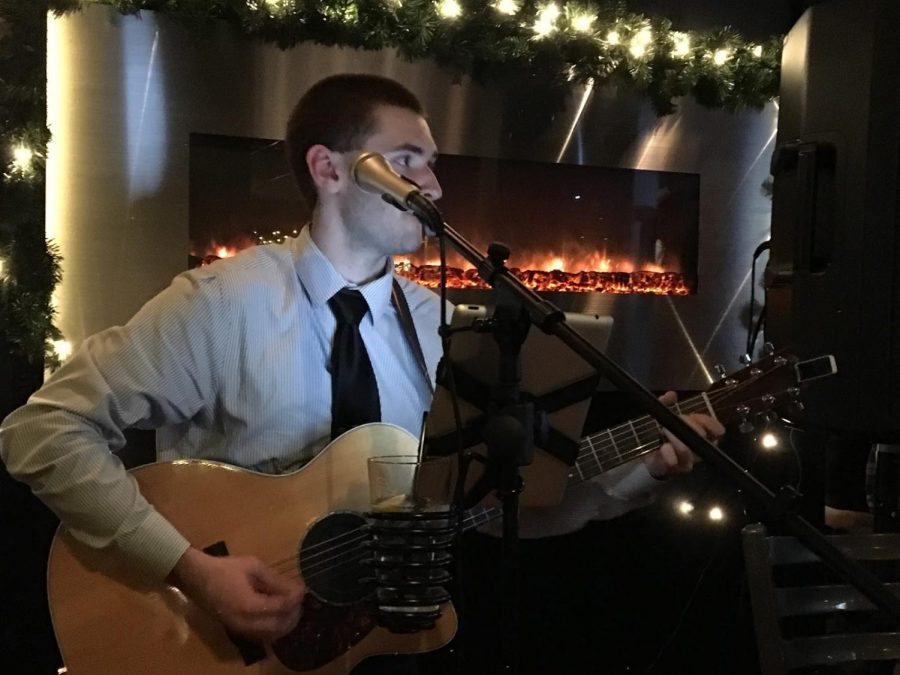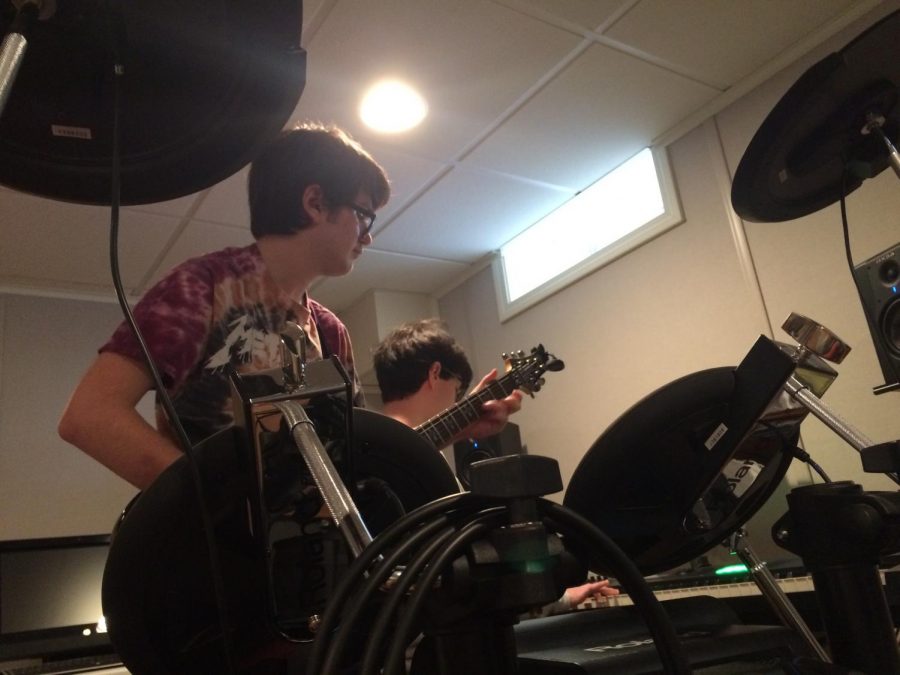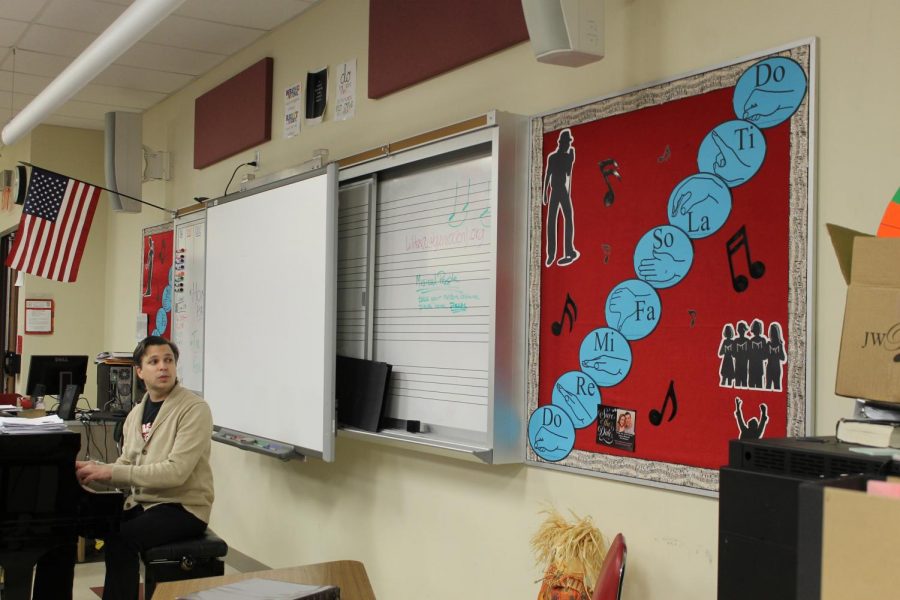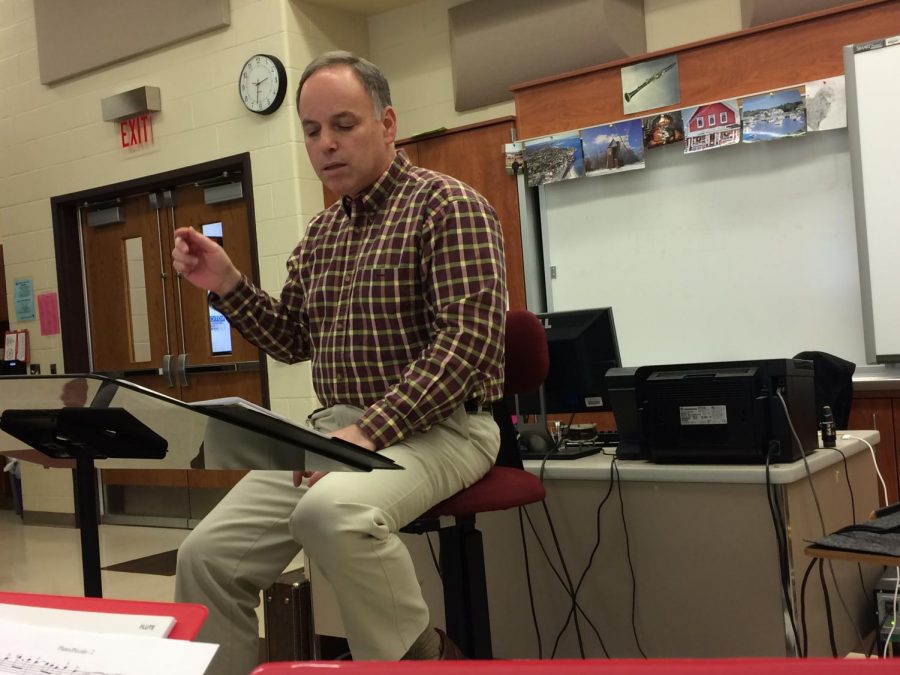The power of music
June 6, 2018

May Pang is with her boyfriend, John Lennon. Photo provided by: (c) May Pang used with permission
In 1969, an eager young woman made her way into the office of the most famous band in the world and asked for a job opening.
During the 1960s and 1970s, when “Beatlemania” dominated the world, May Pang landed a spot in the royalty department for the company that managed the band that created a musical “Revolution” and took the world by storm: the Beatles. She was excited to take on this position and was enthusiastic to be learning on the job. In addition to the Beatles, the company she worked for also managed another group you might have heard of, the Rolling Stones.
After the Beatles’ breakup in 1971, John Lennon and Yoko Ono chose Pang to be their production coordinator and personal assistant. Pang booked the musicians, the studio, and did whatever was necessary to make the recording sessions run without a hitch. While working for Lennon and Ono, Pang said there were “no set rules” to what her job could entail. It was possible for her to do “anything and everything.”
Pang, who has been in the music industry since 1969, has enjoyed her time working at different music studios, including Island Records and United Artists Music Publishing. At Island Records, she handled Robert Palmer and Brian Eno. While at United Artists Music Publishing in Los Angeles, New York, and Nashville, she was given the opportunity to work with both known and unknown artists. Pang helped Jon Bon Jovi, who was unknown at the time, find songs to create a CD. In the late 1970s, she worked with Third World, as well as other Reggae bands. “Each situation was unique, and I enjoyed all of them,” said Pang.
Another influential artist of the late twentieth century was David Bowie, also known for a time as Ziggy Stardust. Bowie was very influential in the music industry and asked Pang to participate in his music video for “Fashion.”
Lennon wrote “Surprise, Surprise (Sweet Bird of Paradox)” for Pang, as she was his girlfriend when he was separated from Ono. Lennon and Pang began their relationship in 1973. She also sings on his track “#9 Dream.” In addition to “Surprise, Surprise (Sweet Bird of Paradox)” and “#9 Dream,” Pang also enjoys Lennon’s song “Whatever Gets You Thru the Night.” This was Lennon’s “only #1 single” throughout his entire musical career. These three songs can be found on Lennon’s album, “Walls and Bridges.” Out of the vast collection of music Lennon wrote, the album “Walls and Bridges” was Pang’s favorite.
Music in general can impact a community, but the Beatles impacted a generation. They experimented with different sounds, lyrics, and looks, significant to the art of music. During his solo work, Lennon wrote lyrics that “were so profound,” people could genuinely relate to his music.
Even though she is currently “semi-retired,” Pang continues to work with musicians, producers, and songwriters. Pang made a career out of music, as she has always loved it. To her, musicians have that ability to connect with people and put their emotions into words so others can relate.
It’s something unpredictable, but in the end is right. I hope you had the time of your life.- Green Day, “Good Riddance (Time of Your Life)”
Matthew Rief plays “Folsom Prison Blues” by Johnny Cash at the Steel Wheel Tavern in Ridgewood, New Jersey. Photo credit: Julia Piermatteo
When Matthew Rief was four years old, he wanted to be a Beatle when he grew up and play a blue guitar.
At age four, Rief did not know the Beatles had broken up. He received his first guitar in first grade. His music career escalated from there, starting with that red guitar from Toys R Us. Rief eventually found out that the Beatles were no longer a band. “At some point, my dreams were shattered,” said Rief.
In the sixth grade, Rief began playing in the youth band at St. Mary’s Church in Pompton Lakes, where he eventually landed a job as the accompanying pianist on weekends. He began drumming in the seventh grade, and he picked up the piano around sophomore year of high school. Currently, Rief gives piano, drum, and guitar lessons and is a student at William Paterson University, where he is studying accounting. Rief originally was majoring in jazz music education, but the more he studied music, the less fun it was for him. He found he wanted to just enjoy music instead of studying music. Studying took the pleasure out of it for him.
While in high school, Rief played the clarinet in concert band. He was asked to play bass in his school’s musicals during high school and even after he graduated. He played in the pit orchestra for The Music Man, Fiddler on the Roof, the Wizard of Oz, and Beauty and the Beast.
“My parents were always playing music,” said Reif. A fan of the Beatles, Rief enjoys George Harrison’s music best, but his music tastes vary, ranging from present day to 60s rock to 1940s jazz. He cites his main influences as Green Day and Jason Mraz and is a fan of Jason Shimabukuro, a ukulele player.
Rief also plays gigs. One of the places he performs is the Steel Wheel Tavern in Ridgewood, New Jersey. Rief gets hired to play gigs by referrals. He has played in Lake George for a thirtieth birthday party, and along with a band, he was the opening act for Al Chez at the Stanhope House. He has a setlist of about 115 songs but only plays a portion of them at his gigs. The lineup includes Frank Sinatra, John Mayer, Johnny Cash, the Beatles, Green Day, the Plain White Ts, and many more music artists. He tries to tailor his setlist to the crowd. For example, he won’t play Sinatra for a really young crowd and stays away from the Chainsmokers if the crowd is older. He tries to “find a balance” in what he plays.
Rief began playing gigs because he wanted to express his artistic creativity and have some freedom. “I wanted to play what I wanted to play,” said Rief. “I kind of wanted to just give it a shot and see what happened.” After he played his first gig, he felt he wanted to continue playing gigs to get out of his comfort zone.
Music has had a great impact on Rief’s life, and he has observed how it has an impact on others as well. At Saint Mary’s, Rief is a musical accompanist on Sundays. There is a boy with down syndrome who sits right next to the piano every week. “He obviously loves it,” said Rief. Rief finds that music can evoke a very emotional response from people. Music makes people happy, yet can also make them cry. Without music, Rief does not know how he would be spending his time. He describes playing an instrument as an “emotional outlet.” Rief quotes Shimabukuro, saying it’s “the quote that summarizes it all.”
“‘If everyone played the ukulele, the world would be a better place.’”
I want to run through the halls of my high school. I want to scream at the top of my lungs.- John Mayer, “No Such Thing”
No Info members AJ Knapp and Blaise DeLeon practice in Blaise’s basement. DeLeon, the band’s bassist, switched to keyboard for “Karma Police” by Radiohead. Photo Credit: Julia Piermatteo
A New Jersey teen jams on the bass as he waits for his bandmates to arrive at his house for practice.
Another teenager walks down the stairs into the basement, his brown, shaggy hair falls onto the tips of his large, thick-frame glasses. He carries his electric guitar and laptop, wearing a tye-dye Metallica t-shirt. The boy playing the electric bass also has shaggy brown hair and wears smaller glasses. He wears a light grey sweatshirt with the word “RESIST” written across it in bold, grey letters. The third teen contacts her bandmates on FaceTime, wearing a thin black choker.
AJ Knapp, Blaise DeLeon, and Natalie Madsen are No Info, an alternative and hard rock band based in Ridgewood, New Jersey. Even though they can describe themselves as alternative and hard rock, they do not box themselves in with one particular genre. DeLeon, their bassist, explained that their music is a “hodge-podge of different genres,” and they want to find a happy medium between the different genres they enjoy. Knapp, DeLeon, and Madsen have their own musical interests that influenced them to be a part of the world of music. Knapp mentions Metallica and Guns n’ Roses, while DeLeon cites Soundgarden, the Cure, Stone Temple Pilots, Radiohead, and Joy Division. Madsen acknowledges Shinedown and Motionless in White. Together, they particularly take note of Green Day, Faith No More, Metallica, and Nirvana.
No Info is not just a cover band. When Knapp was sitting on the bus coming home from school one day, he typed lyrics on his phone to look up different words. That was when he composed “Hollow,” No Info’s only original song. “Hollow” is an anti-drug song because “drugs screw you up.” Knapp wanted to write the song because he felt that this was something he had to “get out there,” as an overwhelming amount of people do drugs and alcohol.
No Info practices in DeLeon’s basement, with a small drum kit and a keyboard with standing speakers on either side. In the back of their musical bubble, a record player rests on a white table, and a computer rests on another white table with a collection of records underneath. Sunlight streams in from rectangular windows and there are small lights on the ceiling, casting light on the keyboard backed by pale grey walls and a hardwood floor. Knapp’s laptop sits next to the foot pedal of the drum kit, and when his foot presses a pedal, the computer screen switches to a different setting, controlling the distortion of his guitar. No Info has welcomed two new members recently: Diego Santiago on drums and Joe Green on rhythm guitar.
Knapp, DeLeon, and Madsen all deal with the pressures of school, stress, and society, and they escape into music to “help with different emotions.” “Music is that one thing that everybody can relate to. Music can really just bring people together and especially a community,” said Knapp. Knapp comes home from New York City with “a ton of homework every night.” Music helps him try his best in his schoolwork and keeps him level-headed. When he listens to music, “everything else just disappears.”
DeLeon is able to connect with his teachers regarding their shared musical interests. His English teacher has shown him some hardcore punk bands, the blues, and folk music from the 1930s and 1940s. DeLeon has even discovered some songs from the Dust Bowl. DeLeon said that music is “an art form that really speaks to individuality. Every artist is unique, and I just find that very admirable. I think that’s what makes it a very special art form.”
Madsen listens to music to help her de-stress and focus on her work. She always wears her headphones during school, even during class, just to relieve some stress. When she concentrates on the lyrics, she knows that “everything is gonna be okay.” She uses music to get her emotions out, and if she did not have music, she “would be such a different person” because she would not be able to release her emotions. To Madsen, music is “everything.” Music has pulled her out of dark times. “All I can really say is just music can save you,” said Madsen. “It really can.”
Listen to the music of the moment, people dance and sing. We’re just one big family.- Jason Mraz, “I’m Yours”
One day, a five-year-old boy happily agrees to take piano lessons. Later, a young college student sings with the Syracuse University Singers.
Carl Helder and Anna Lilikas direct Glen Rock High School’s Women’s, Chamber, and Concert choirs.
Helder was an agreeable child, so when his parents asked if he wanted to play piano, he did not object. When he reached the middle of high school, he decided that he wanted to pursue the path of music. While making this decision, Helder knew that making a living as a musician would be difficult, so he decided to study different aspects of music. He read up on the lives of composers such as Mozart and Beethoven to see how they balanced being teachers, performers, and composers. Helder has composed some of his own music, including a piece for his wife. Besides the piano, he plays electric bass, guitar, flute, clarinet, a little trumpet and violin.
Helder loves piano repertoire, jazz, and the blues, including artists like Beethoven, Chopin, and Bill Evans. He is also a fan of jazz pianist Thelonious Monk, who was around during the bebop era of jazz and is known for his detached and sporadic style.
Lilikas’ interest in music started with listening to Greek music and hearing her father sing. She took piano lessons when she was younger and played the flute in middle and high school. While attending Syracuse University, she learned how to play a plethora of instruments, including cello, trombone, french horn, and the bassoon.
Lilikas loves musicals, especially In the Heights and Next to Normal. Not only does she love musicals, but she also enjoys Gospel music, especially when her choirs are singing it. Gospel music has a “really great meaning” and “fantastic energy.” Lilikas and Helder like to choose a variety of different pieces for the choirs to sing. “I think it’s a big world of music,” said Helder. “I would love to be able to touch on as much of it as possible in the four years that a student is with us.”
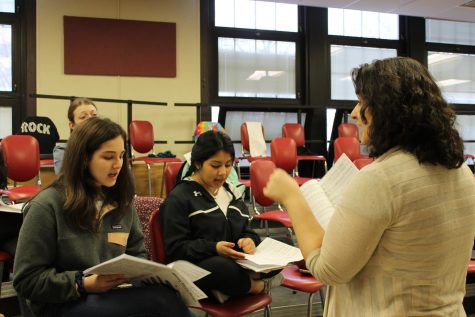
Lilikas tries to vary the pieces she chooses for the choirs to sing. She tries to “do a little bit of everything” to “reach everyone.” In high school, choir helped her feel a sense of belonging and gave her a place to call home. Music can bring a community together, for it is played at events where people congregate. She mentioned that “The Lord Bless You and Keep You” and “Omnia Sol” were always sung at graduation. To her, this tradition is a special addition to the Glen Rock community. Music is also important to the family aspect of society. “We preserve certain aspects of our culture through music, especially children,” said Lilikas. “Children use music as play very often.” This music is then passed down through the generations.
Music has played a crucial role in Helder’s life. His mom thought that music was an important part of education and the development of “the musical mind.”
“There’s rarely a moment of the day that goes by that I’m not involved with music,” said Helder.
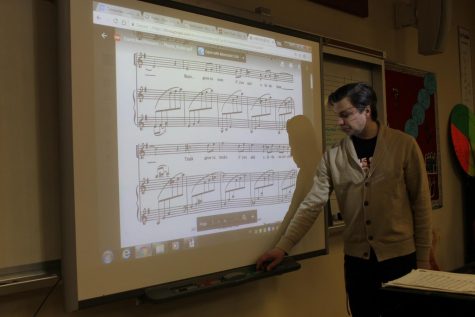
Music can bring a community together, as it touches upon different cultures, like one tastes a different dish. But, music does not always have a positive effect on people. “Sometimes music can be divisive,” Helder said. Music can be divisive if it is about certain topics people do not want to touch on. He finds that unfortunate because music is something that is part of the “human experience.” There’s value in sharing it because it is a part of people’s culture.
Or try my hand in a marching band while I play on my kazoo, and there won’t be trouble in the world no more.- Mindy Gledhill, “Trouble No More”
Mr. Kurland conducts the tenor and baritone saxes in “Flourish for Winds” during class. Kurland chose to play “Flourish for Winds” in the 2018 Spring Concert because it is in 6/8, and there is interesting percussion. He listened to the recording of the song and thought it sounded cool. Photo credit: Julia Piermatteo
Who knew a simple visit from the Glen Rock High School Jazz Band would influence a third grade boy so much?
Jeffrey Kurland attended Richard E. Byrd School and decided to pick up an instrument after the jazz band paid a visit.
Kurland attended Glen Rock High School and now instructs the marching, concert, and jazz bands. He plays the flute, saxophone, trumpet, and all the rest of the band instruments. His primary and favorite, is the clarinet, which he has been playing since the fourth grade. His dad listened to big bands from the 1940s, but Kurland prefers “70s light rock.” The first record albums he ever got were by the Beatles, which he listened to on his “little portable record player.” Musical scores are his favorite to play because they’re fun, especially when he is playing several instruments.
He decided to become a music teacher because he had a knack for music. While student teaching during his senior year of college, he realized how much he loved teaching music to others.
Kurland’s musical influences play a role in the pieces he chooses for the GRHS band. It is music that “stands the test of time.” The marching band flip-folders are filled with songs from the 60s, 70s, and 80s, such as “Rock and Roll” by Led Zeppelin and “25 or 6 to 4” by Chicago. People still listen to this music. For this year’s spring concert, Kurland has chosen “Mountain of the Sun,” “Our Heritage,” and “Flourish for Winds,” just to name a few. He also chose a Led Zeppelin medley because people are familiar with that band and still listen to their music. He chose “Our Heritage” because “marches are an American art form.” Back in the 1920s and 1930s, people would go to concerts solely composed of marches.
Kurland has noticed that music is a very important part of the Glen Rock community, most specifically noting Glenstock, Cabaret Night, and Coffeehouse. Lots of people also attend the winter and spring concerts. The Glen Rock Pops performs, and so do various rock groups. “I think it’s like one of those things that people just gravitate to,” said Kurland. “All the arts can be used to bring people together.” He also mentions that sports are other events people are drawn towards.
As a high school band teacher, Kurland is happy when he hears about his former students who have continued their musical activities after they have graduated. There are some people who have stopped playing their old high school instruments but then picked them up again later in life. “I would like people to continue to play wherever they can and to listen to music critically,” said Kurland. “Actually listen to music, and be open to different kinds of music.”
Kurland will start a new career at the end of this year as a mental health counselor. Looking back on his musical career, he reflects that being surrounded by music all the time is a “nice way to go through your life.” Since he is so used to being immersed in music, he is worried he will miss it when he retires.
We’re Sgt. Pepper’s Lonely Hearts Club Band, we hope you will enjoy the show. – The Beatles, “Sgt. Pepper’s Lonely Hearts Club Band”
A long purple light casts a dreamy glow on two performers in the corner of Brix Restaurant and Pizza Bar as they sing “Dreams” by Fleetwood Mac.
One plays the guitar, dreary purple shadows are cast down on him. The other keeps the beat on her drums, using brushes on the snare and cymbals, the bass drum illuminated by little white lights.
Christopher Palmerini and Annie Masciandaro, also known as Annie Mash, are the Annie Mash Acoustic Rock Duo.
Located in a strip mall, Brix Restaurant and Pizza Bar hosts the performances of this rock duo. The windows are paned with dark, wooden panels and framed with strings of little white lights. The walls are a creamy, off-white color in a dimly lit room. One can look into other rooms in the restaurant through arches that are lined with bricks.
The restaurant is strewn with wooden tables and chairs, as well as tables with brown cushioned booths. Cloth napkins are rolled around utensils and placed on top of plates. A lantern illuminates each of the high-tables. The rest of the tables are decorated with dainty white flowers in a gold Mason jar. The bar is outlined by bricks, and boxed, wooden shelves hold various bottles, also backed by bricks. Light fixtures hang from the brick lining like glowing, upside-down ice cream scoops, and high chairs are placed in a line at the front of the bar. The bar has clusters of thin, red straws spread about, and several beers are displayed on tap. People start to gather at the bar, but the restaurant does not get crowded until later in the evening.
Palmerini and Mash play songs they love, the songs they grew up with. Palmerini grew up in a musical family, as everyone around him played instruments. His mom played the piano and sang in the church choir, while his dad played the saxophone, flute, piano, and clarinet. One of his main influences is the Beatles. Palmerini was in a house band for 25 years, and the musicians would come to attend the convention to sign autographs. They would rehearse together in his hotel room. He’s played “Can You Hear Me Knocking” with Mick Taylor, the lead guitarist for the Rolling Stones. He’s played with keyboardist Keith Emerson, as well as the keyboardist for the Doors. Palmerini played “Daydream Believer” with Davy Jones, a member of the Monkees.
Mash did not grow up in a musical family, however she was exposed to the drums by watching different family bands on television, such as The Brady Bunch and The Partridge Family. She also grew up watching the Beatles cartoons. The moment Mash laid eyes on a drum set, she felt “completely drawn” to it. She took drum lessons from when she was nine until the age of eleven. When Mash was 15, her uncle came to live with her family, and her uncle’s best friend lived across the street. After school, Mash, and her uncle and his friend would go up to her room and jam on the guitar, saxophone, and drums. One of her main influences is Led Zeppelin, especially drummer John Bottom.
Mash and Palmerini have been a duo for 12 years and mostly sing songs from the 60s and 70s. While performing at Brix, one crowd pleaser was “Ruby Tuesday” by the Rolling Stones. When they sang “These Boots Were Made For Walkin’” by Nancy Sinatra and Carly Simon’s “You’re So Vain,” people started to sing along, and one woman even got up to dance.
Both Palmerini and Mash noted that the music industry has changed. Palmerini misses the good old days when he used to take a trip to the record store to purchase a brand new album. “Nobody buys records or CDs anymore,” said Palmerini. Now, musicians do not have the chance to grow and improve. Back then, an artist could make an amazing second album if their first album wasn’t that great. “Nowadays, if your first album’s not amazing, you don’t get second chances anymore.” Palmerini also notes the lack of live musicians at events where more DJs are popping up. He hopes that more live musicians come back to the party scene.
Mash notes that music has become the “flavor of the week.” “There’s not as much substance to it anymore,” said Mash. “It’s not as deep as it used to be.” Led Zeppelin and the Beatles were around in the 60s and 70s, and their music is still relevant today. Compared to them, Mash does not think that Justin Bieber and Taylor Swift will be “relevant in 20 years.”
Palmerini witnessed the power of music just a week before his father passed away from Alzheimer’s and dementia. “He couldn’t remember the word pizza,” said Palmerini, yet when Palmerini played the piano for “Over the Rainbow,” his father played the melody on the saxophone perfectly.
Mash said music “makes you find your soul.” Music can heal people and also bring them together. Being a drummer and a singer makes Mash who she is. “Without it, I’m lost,” said Mash.
